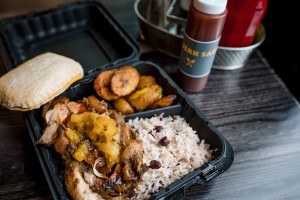Meet Scott Jones, Barbara Lynch’s Next Star Chef

Scott Jones / Photo Provided
The Barbara Lynch Gruppo shocked the restaurant community on Tuesday with news of Kristen Kish’s departure from Menton on March 8. Taking her place will be Scott Jones, the current No. 9 Park chef de cuisine who began his culinary career less than five years ago. We caught up with Jones to discuss what’s next for Menton, how he plans on utilizing his background in science, and his distaste for the current “small plates” trend.
Congratulations on the big promotion!
It’s been a big change and one that I wasn’t expecting to happen now, but I’m really excited about the opportunity. April 4 will be my one-year anniversary of being chef at No. 9., which isn’t very long. Just for myself, I want to work there as chef for a year before I leave. So, I’m officially leaving after the first or second weekend in April.
Who will be filling in after Kristen Kish leaves on March 8?
I’ll be spending some time there in an unofficial way. Chef Colin [Lynch], who is the executive chef of the Gruppo, is going to take over full-time for the month in between to sort of whip it into shape.
At No. 9 Park you were flirting with the idea of making tasting menus that were customizable. Is that something you’ll consider as you take over at Menton?
I hope it’s something we can do there. It’s a big question I’ve been asking myself at No. 9 over the past several years. What’s the next movement in fine dining? Where are we trying to go to provide the best opportunity for our guests? Corby [Kummer] came out with that enormous slap in the face to tasting menus a while ago. Let’s just call it what it was. He was essentially saying, “I don’t want to eat nine courses of your menu every time I come in.” Which is fair. At the same time, people don’t necessarily want to get stuck in a three-course app, entrée, dessert format. I think that’s why chefs have been so excited about doing small plates.
Pretty much every new restaurant that opens is doing small plates. Personally, I hate small plates. There are places that do it really well, and I love those places. But in general, I hate being told that plates are for sharing when the portion is only big enough for myself. I’m not convinced that small plates are the next thing we should be doing, especially in fine dining. I’m hoping that when I get to Menton and meet with the general manager, Meredith Gallagher—I’ve been a big fan of hers since she was at Craigie on Main, so I’m pumped to work with her—that she and I can sit down and say ‘what’s the next best thing for Menton?’ We want to make this one of the best restaurants in the country.
Do you think there’s something to what Corby said? Have you seen the same sort of negative feedback to tasting menus from regular diners?
No, I don’t! I think the only blowback is when people look at the menu, and they don’t want to miss out on the à la carte menu. My response to that is “Fine, tell me what you want to eat and I’ll put them in the right order.” With that being said, I don’t want to do that. When I go to a restaurant and they have a tasting menu, I want to experience it. I understand that they’re trying to tell me a story. There’s an arch to every tasting. There’s a peak. There’s a whole experience and you should give the chef an opportunity to tell that story.
Well, if you had been able to implement those changes at No. 9, wouldn’t that tailoring have jeopardized the story you were trying to tell?
No, we were trying to build it in a way that it resembled those old choose-your-own-adventure stories, where you can flip to the next page and still feel like you’re reading a complete story. Those things were always a little goofy and somehow you always died in the end, but this was going to be different. We were going to let people design their own stories with the help of our voice. It’s something we’re still talking about. It’s still in its baby stages, but that might still be on the books. No. 9 is a restaurant that’s been around for 15 years and has been successful from day one. It’ll continue to be successful. And it will always be evolving.
Is your science background going to be playing a part in what you do at Menton?
Not in the way everyone thinks. I am not going to be using weird chemicals and things like that. That is not how I cook. I want people to understand what they’re eating. I want to do different combinations of foods and ingredients diners might be unfamiliar with. You want to teach your guests something. So, I approach it from a professorial viewpoint. I experiment a lot with different things, like textures, without using gelatin and xanthan gum and all that bullshit that I do not want to eat. That’s such an easy way out. I want to make food like they’ve been making it for thousands of years. It’s more difficult than doing it with chemical shortcuts. The way my background has helped me is the fact that I wasn’t 18 when I started, like so many people in restaurants. They don’t know what the hell is going on in their lives let alone the kitchen.
What are the major differences between No. 9 Park and Menton? Will those differences take you out of your comfort zone?
What I always tell people is that No. 9 is a seasonal menu with French technique and Italian sensibilities. At Menton, it’s been more French in spirit. Colin [Lynch] and I just printed out all the menus from No. 9 over the past 15 years and we read them over. You could tell if the chef leaned more French or Italian. Under my time there it’s been more Italian because that’s my comfort zone. I like that food. I want to eat that food. And I generally think other people want to eat that kind of food, especially nowadays. You want something with more olive oil and less butter. People don’t want to feel heavy at the end of a long meal. At Menton, the signature dish is butter soup. The cuisine at Menton is going to change when I get there. It’ll be something more in line with mine. People are eating long meals, they’re really dressed up, and they’re in a beautiful, luxurious room, and you want them to be able to go out afterward and not feel gross. That’s generally my goal, that they don’t feel terrible at the end of the tasting menu.
But you’re into mayo.
Ha! Yes, but that’s just olive oil emulsified. It’s still not butter. You know, I’ve been trying to figure out how my love of mayonnaise is going to fit into Menton and I don’t know yet. I’m a little worried. But I’m going to figure it out.
Was it a shock when you heard that Kristen was moving on?
It was and it wasn’t. We all knew that she has a lot of opportunities open to her right now and we didn’t want to watch her let them all pass by. I know it’s been tough for her to be running a kitchen like Menton and at the same time traveling a lot. I think she’s been doing a lot more than what people realize.
Within four-and-a-half years, you’re moving onto to become chef de cuisine at one of the best restaurants in Boston. When you changed tracks from science to cooking, did you ever envision your culinary career taking off so quickly?
When I started, I had to come up with some vision of how this was all going to go down for me. I told my husband that within five years I want to become a sous chef somewhere. In 10 years I wanted to be running someone else’s kitchen. Then in 15 years I wanted to own my own restaurant. That came from reading a lot of shit that people write about being in kitchens that don’t know anything. That timeline has been adjusted, obviously. I think it’s going to be a lot of fun and a lot of work. But I’m looking forward to it.


